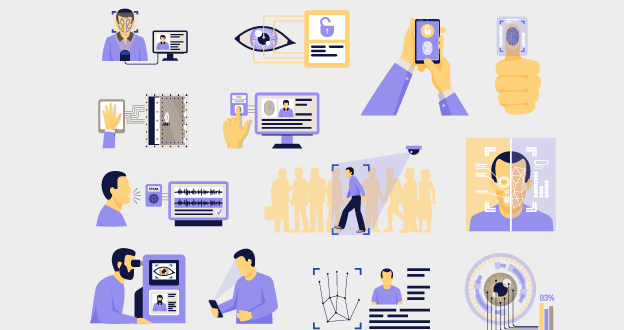Tags Digital Transformation eGovernment Identification
Biometrics takes advantage of the unique biological characteristics of people to identify and authenticate individuals in a reliable and fast way. Here are 7 typical use cases for biometric technologies that best exemplify the promise of biometrics:
- Law enforcement and public safety – an automated biometric identification system (ABIS) can create and store biometric information that matches biometric templates for faces, fingers and irises. Currently, live facial recognition technology is also being developed and tested in many countries to enhance security in cities, at airports, at borders and at other sensitive sites.
- Military – militaries have a keen interest in knowing their (potential) enemies. For this reason, some have been collecting biometric data for 10-15 years. Due to its sensitive nature, additional information about how this information is being used is difficult to come by.
- Border control, travel and migration – there are over 1.2 billion e-passports in circulation. This means that 1.2 billion travelers have a standardized digital portrait in a secure document. This helps to both speed up processes (e.g. automatic border control, self-service e-gates) as well as give travelers a more enjoyable experience.
- Healthcare and subsidies – biometric ID cards are being used to verify identification prior to accessing government services or healthcare. This helps ensure that benefits are being used by the right person as well as speed up the delivery of those benefits.
- Civil identity, population registration and voter registration – an automated fingerprint identification system (AFIS) database linked to a civil registry database can ensure the identity and uniqueness of a person to others in a reliable, fast and automated way. This has a number of benefits from helping properly distribute public subsidies to ensuring the “one person, one vote” principle is followed.
- Physical and logical access control – biometric access control systems help prevent unauthorized individuals from accessing facilities or computer systems and networks. Unlike codes, static passwords, one-time passwords or access cards that rely on data that can be forgotten or lost, biometric authentication is based on who people and their biological characteristics.
- Commercial applications – know your customer (KYC) processes are mandatory parts of identifying and verifying the identity of the customer. With the use of biometrics, financial institutions (or even telecom operators) can make mandatory KYC checks faster and more efficient.
 BFC Bulletins Monthly News Digest
BFC Bulletins Monthly News Digest




